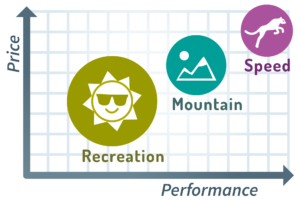
EDUCATIONAL GAMES FOR BUSINESS
Strategic Management
Teach strategic decision-making skills across all functional areas with a realistic, dynamic simulation.
The Strategic Management simulation lets your students experience the management of a business strategy in a competitive, yet safe virtual business environment. The simulation integrates all the functional areas of business without delving into the weeds, providing a vehicle to gain the confidence a business student needs in the world.
Students act as executive teams making realistic business decisions in the context of a whole enterprise. Each decision round played builds upon knowledge retained from the previous round. Learning content is presented at the exact moments when it is needed for decisions in order to increase retention and get students playing sooner.
Students learn to interpret market feedback, analyze competitors’ moves, and make quick adjustments to their strategy. Marketplace Microsimulations available at critical points during the exercise cover select business concepts in more depth to ensure that students master the course material. Strategic Management is available in two product storylines, 3D-printed bikes or our classic personal computers scenario. *Language available in Bike edition.
Typical courses
Capstone business courses
Educational level / Class size
Ideal for small to very large (1000+) classes of third or fourth year undergraduates
Decision rounds
6 decision rounds of 1.5-2 hours
Languages
English*, Spanish, Portuguese-Br*, Chinese, French*
Master the Tools of Management
Business Strategy
Formulate a strategy to profitably serve up to 3 market segments through interconnected tactical decisions.
Product Marketing
Analyze key market data, then create bicycles from an intermediate set of components. Price and promote them for the targeted segments. Invest in R&D to gain a competitive edge.
Sales Channel
In up to 4 markets, manage a sales strategy with brick- and-mortar and internet sales channels based on market potential and available resources. Hire and train sales staff to develop demand.
Lean Production
Use 3D printing to enable just-in-time manufacturing. Develop production plans to meet projected demand and minimize costs and lost sales.
Compensation & Benefits
Devise competitive compensation packages for sales force and production workers to maximize their productivity.
Financial Management
Use basic financial statements, profitability reports, and financial ratios to manage operations. Project finances and manage debt and equity.
Strategic Negotiations
Explore technology licensing to form strategic alliances.
Management
Perform SWOT analysis and practice performance-based management across all functional areas to ensure the long-term health of the firm.
Explore this simulation with a  quick demo.
quick demo.
Realistic Experience
Student teams start up new businesses and compete in a simulated market. They are challenged to develop a niche market based on newly available technology.
Your students study industry data and formulate a business strategy. They produce and sell products, gaining experience by testing ideas and learning from the results.

Learning content is gradually and purposefully added as the market evolves. Based on customer feedback, competitor analysis, and financial reports, students manage their strategy in a dynamic, competitive environment.

Balanced Scorecard Metrics
To ensure that students learn to manage all aspects of business, a Balanced Scorecard is used to evaluate team performance.
- Financial performance
- Market performance
- Marketing effectiveness
- HR management
- Manufacturing productivity
- Asset management
- Financial risk
- Creation of wealth
- Investment in the firm’s future
Class Size Options
 Play Against Classmates
Play Against Classmates
Because students compete against their classmates, all teams advance through the game in sync. The friendly rivalry creates a stimulating and engaging experience.
Ideal for small to large classes of third or fourth year undergraduates.
Teams of 4-5 students work well. Playing in teams cultivates soft skills such as leadership and communication.
 Play Against the Computer
Play Against the Computer
Teams compete against the computer and progress at their own pace, which is great for classes needing low overhead.
Ideal for small to very large (1000+) classes of third or fourth year undergraduates.
Teams of 4-5 students work well. But students can play individually, eliminating the need to arrange teams, which may be impractical in large classes.
Engaging Storyline
Challenge your students to develop a new, niche market using an advanced 3D printing technology to build carbon fiber bike frames. The new bikes are strong, lightweight, and can be custom tailored for each rider. Bikes can be built to demand, eliminating most of the inventory that would otherwise be held, and reducing distribution costs. The new bikes promise to create a brand new market opportunity. Will your students reshape the bike industry?
Why Choose Marketplace?

Turnkey Solution
Comprehensive tools to setup, monitor, and grade. Student work is self-guided with built-in instruction based upon a sound teaching methodology refined over 30 years.

Easy to Access
Cloud-based, works on any common Internet browser and operating system. Meets the WCAG 2.0 AA accessibility requirements.

Support 7 Days a Week
Our responsive staff provide comprehensive support by phone, email, or web-conferencing to ensure that you and your students get the most out of Marketplace.

 Play Against Classmates
Play Against Classmates Play Against the Computer
Play Against the Computer